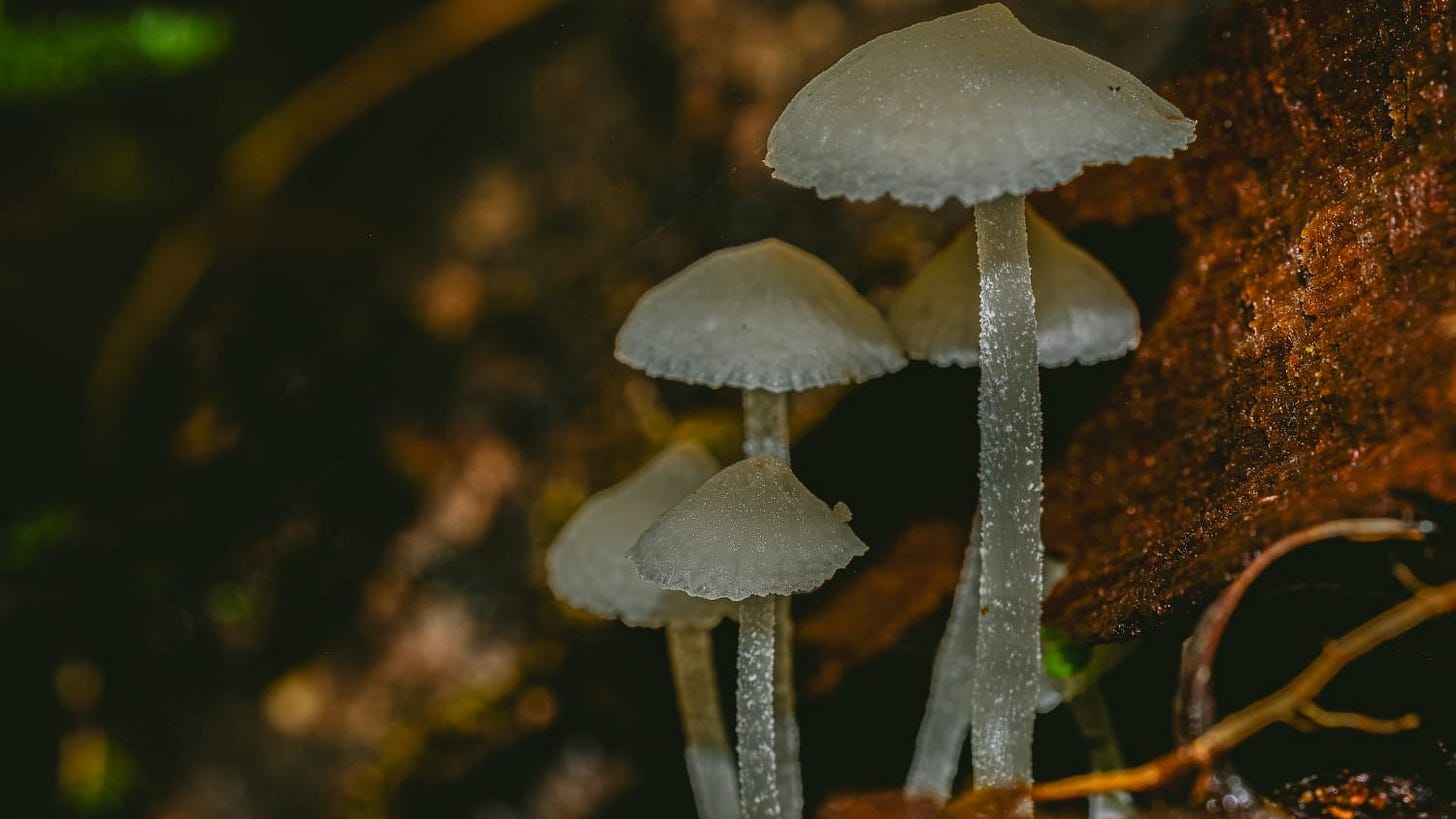Letter 7 - Joy And Grief Are Companions
Do you find that sadness gives way to some amount of comfort and joy?
Hello, dear reader,
Did you try our mulled wine recipe? And did you think of us when you peered into your masala box?
Tracing the origin of the food you consume isn't only useful for calculating how much one has to pay for delivery on food apps. It also helps ensure that the food is fresh and that the impact on the ecosystem is gentle.
Tracing origins.
I've been thinking about that a lot lately.
Ever since Anish Shah, our Brand and design Lead, sent us this Instapost. The idea of mushrooms laying a path between a beloved pet's grave and the house boggled our minds. I was deeply moved by the video, and as is the case with sadness and coping, it gave me such hope. If we could be visited by a pet, a family member, or a friend from now or in the afterlife, then that's almost always a good thing, isn't it?
When I miss loved ones, I listen to songs they like or watch movies I've watched with them. Or when I see something they introduced me to, I smile as though they put it there for me to experience and enjoy. Do you do this, too? And do you find that sadness gives way to some amount of comfort and joy?
We know that spending time in nature is therapeutic. People often call hikes life-changing for a reason. Walt Whitman affirmed that at the end of it all, “Nature remains; to bring out from their torpid recesses, the affinities of a man or woman with the open air, the trees, fields, the changes of seasons — the sun by day and the stars of heaven by night.”
And there is an affinity. We are drawn to nature despite spending less time showing it. Why else do we brave irate crowds and unjustifiable ticket prices to travel to locations where we can take candid photographs gazing at a river or contemplating a snowcapped mountain?
If we do spend more time, we will realise that the sounds of nature are changing in our neighbourhoods. This article makes for fascinating reading. Folks from across the world write with such heart on sounds they recall from their younger years that they can no longer hear: bees, robins, and blackbirds, to name just a few.
Take a moment or more to think about nature sounds from your childhood. What is missing, and what has stayed? And if you trace the origin of this absence, what would you attribute it to? A loss of habitat and unregulated construction would be my guess. We've discussed this in previous letters as well.
It takes work, but grief can turn into joy. While we have now learnt that “Europe was not covered by dense forest before the arrival of modern humans,” the making of a plant is still nothing short of remarkable. It's no exaggeration that plants were created in an extremely rare, fit-to-be-deemed massive breakthrough in evolution event that happened 1.6 billion years ago.
Energy-producing organelle - they trace their origin to 2.2 billion years ago - absorbed cyanobacteria with its ability to harvest energy from sunlight. These organelles, now known as chloroplasts, gave not just the sunlight-harvesting superpowers but also the colour we most associate with a fantastic group of lifeforms. Of course, we are talking about green and about plants. Something to marvel at and take joy from, wouldn't you say?
And it's good news from the Western Ghats, too. Scientists have discovered a tiny ‘dragon,’ a lizard species with the impossibly adorable name Agasthyagama edge. I am willing to wager that, unlike some tourist photographs, this is indeed a candid and rather regal photograph.
If you find yourself struggling a bit today and that grief doesn't shift to joy as easily as one may make it out to be, please, read this poem by an adored and respected poet:
In Blackwater Woods by Mary Oliver
Look, the trees
are turning
their own bodies
into pillars
of light,
are giving off the rich
fragrance of cinnamon
and fulfillment,
the long tapers
of cattails
are bursting and floating away over
the blue shoulders
of the ponds,
and every pond,
no matter what its
name is, is
nameless now.
Every year
everything
I have ever learned
in my lifetime
leads back to this: the fires
and the black river of loss
whose other side
is salvation,
whose meaning
none of us will ever know.
To live in this world
you must be able
to do three things:
to love what is mortal;
to hold it
against your bones knowing
your own life depends on it;
and, when the time comes to let it go,
to let it go.
From the wishing you well bunch at Mycelium, till next time, cheers, and bye for now.





